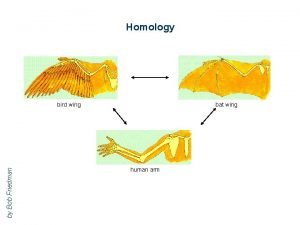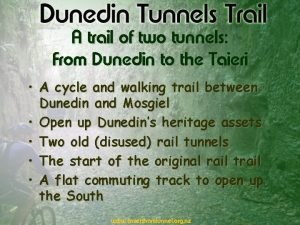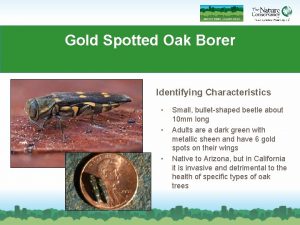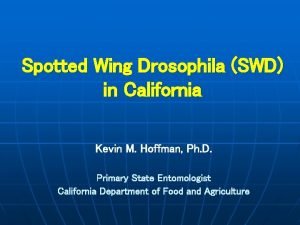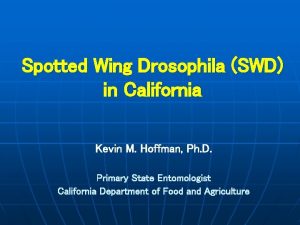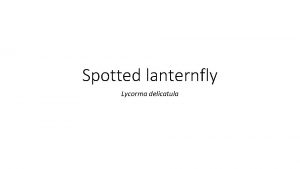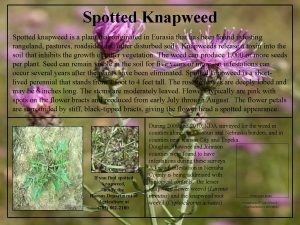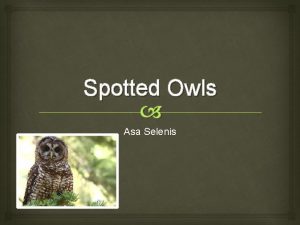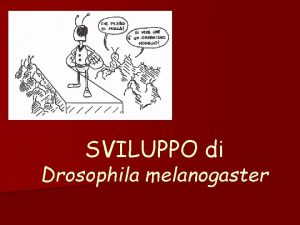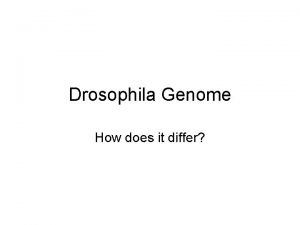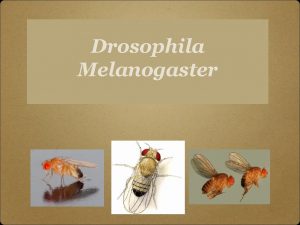Spotted Wing Drosophila Management using High Tunnels Erik











- Slides: 11

Spotted Wing Drosophila Management using High Tunnels Erik Gundacker, FNC 14 -948 NCR-SARE’s Farmers Forum, 2016

Agenda • • SWD Management using high tunnels Expanding growing season to 9 months Growing vertically Vermicomposting for the farm

Scenic Valley Farms • • Designs and manages high tunnels, climate control systems, and solar thermal heating technology Fifteen high tunnels on farms in Minnesota and Wisconsin Produces organically certified tomatoes, peppers, blackberries, strawberries, cucumbers, herbs, leafy green produce, ginger, garlic, etc Decades of agriculture and engineering experience

Them .

SWD management using high tunnel • • • 2 year SARE Grant to research management of Spotted Wing Drosophila using high tunnels In 2015 4 th year for SWD at SVF on blackberries, strawberries, peaches In 2014 research was limited due to brutal winter on blackberries In 2015 due to cold winter (normal winter) lost 90% of blackberries crop both Rosemount, MN and Readstown, WI Installed insect netting on side walls, doors, and end walls Insect netting bought from http: //www. duboisag. com/en/proteknetinsect-netting. html – 6’ 6” x 328’-80 gr - $304, maybe local supplier • • Insect netting restricts air flow by 20% Traps – cedar cider vinegar, liquid dish soap or sugar water & yeast Set two traps inside and two outside tunnels Install one Bumble Bee hive in each berry tunnel – close hive before spraying

SWD management using high tunnel (results) Results: • In 2014, 2015 Noticed SWD in outside traps mid July • Rosemount blackberry tunnel – No SWD entire season • In 2014 Readstown blackberry tunnel – some SWD, came in thru door • In 2014 Readstown strawberry tunnel –unintentionally let in SWD thru door. Proceeded to pick all ripe berries, applied Pyganic for three consecutive days, then two applications of Entrust seven days apart – in two weeks eradicate SWD • Outside strawberry bed infected – picked clean, row cover hoops with netting attached using clothes pins, sprayed Pyganic and/or Entrust through netting. No sign of SWD after two weeks • Field grown management – Entrust and Pyganic on a 3 day rotation possibly Mustang Max (Non OMRI) • • Pollinators? • Insect netting repair – 3 M Use netting for cucumber beetle before beetle appears SWD on culled tomatoes Lessons Learned – if SWD numbers significant in high tunnel, no eradication even with netting & spraying

Automated Solar Thermal high tunnels

Vertical growing produce in tunnels Grown in dirt not hydroponically using 6 - 8 sided stacked pots year 1 – day neutral strawberries in PVC pipe - not very good yields, does not over winter year 2 – day neutral strawberries, lettuce, herbs in PVC pipe, day neutral strawberries in 4 and 8 sided pots year 3 – day neutral strawberries in 8 sided pots (goal ½# per plant, actuals. 21#s/plant July 23 to Nov 29 th) ) year 4, 2016 – day neutral strawberries in 8 -16 sided pots (goal ½# per plant, plant by March 1, begin harvesting second week in May Goal is 1# per plant for conventional market, organic certified, harvested for 7 months Strawberries – 12 K plants per 30 x 96 at 1/2# per plant- 10 x the plants vs bedded plants - Revenue $25 k per 30 x 96 tunnel

Vermicomposting using tunnels (Next year) • • SVF uses 150 -200 cu yards of horse compost per year Hard to get Commercial composts in these quantities cost prohibited Design and develop a vermicompost system to replace some of the horse compost Used farm’s pruned plant material and culled produce Use food waste from other sources Use high tunnel to pre-compost (hot compost) inputs Design a system that is available to other growers

Located somewhere in SE MN or SW WI

Contact Us Erik Gundacker (563) 650 -3654 gun@usinternet. com Craig Gundacker (612) 961 -3871 cegundacker@scenicvalleyfarms. com www. scenicvalleyfarms. com
